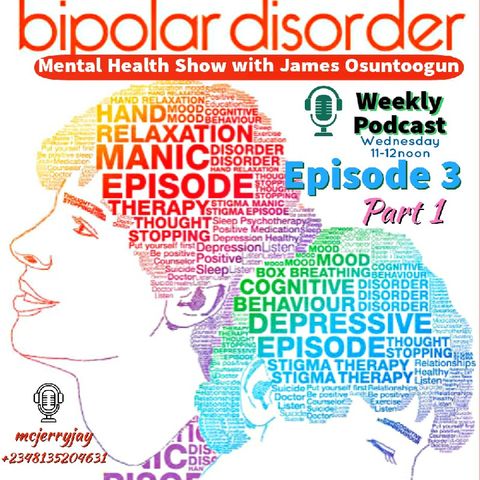BIPOLAR DISORDER PART 1
Sep 8, 2021 ·
31m 36s

Download and listen anywhere
Download your favorite episodes and enjoy them, wherever you are! Sign up or log in now to access offline listening.
Description
BIPOLAR DISORDERS with Dr Tosin Lawal (Mental Health and Behavioural Medicine, Federal Medical Center, Abeokuta, Nigeria) on Mental Health Show with James Osuntoogun (MC JERRYJAY). Bipolar disorder, formerly called manic...
show more
BIPOLAR DISORDERS with Dr Tosin Lawal (Mental Health and Behavioural Medicine, Federal Medical Center, Abeokuta, Nigeria) on Mental Health Show with James Osuntoogun (MC JERRYJAY).
Bipolar disorder, formerly called manic depression, is a mental health condition that causes extreme mood swings that include emotional highs (mania or hypomania) and lows (depression).
When you become depressed, you may feel sad or hopeless and lose interest or pleasure in most activities. When your mood shifts to mania or hypomania (less extreme than mania), you may feel euphoric, full of energy or unusually irritable. These mood swings can affect sleep, energy, activity, judgment, behaviour and the ability to think clearly.
Episodes of mood swings may occur rarely or multiple times a year. While most people will experience some emotional symptoms between episodes, some may not experience any.
Although bipolar disorder is a lifelong condition, you can manage your mood swings and other symptoms by following a treatment plan. In most cases, bipolar disorder is treated with medications and psychological counseling (psychotherapy).
show less
Bipolar disorder, formerly called manic depression, is a mental health condition that causes extreme mood swings that include emotional highs (mania or hypomania) and lows (depression).
When you become depressed, you may feel sad or hopeless and lose interest or pleasure in most activities. When your mood shifts to mania or hypomania (less extreme than mania), you may feel euphoric, full of energy or unusually irritable. These mood swings can affect sleep, energy, activity, judgment, behaviour and the ability to think clearly.
Episodes of mood swings may occur rarely or multiple times a year. While most people will experience some emotional symptoms between episodes, some may not experience any.
Although bipolar disorder is a lifelong condition, you can manage your mood swings and other symptoms by following a treatment plan. In most cases, bipolar disorder is treated with medications and psychological counseling (psychotherapy).
Information
| Author | James Osuntoogun (MC JERRYJAY) |
| Organization | James Osuntoogun (MC JERRYJAY) |
| Website | - |
| Tags |
Copyright 2024 - Spreaker Inc. an iHeartMedia Company

